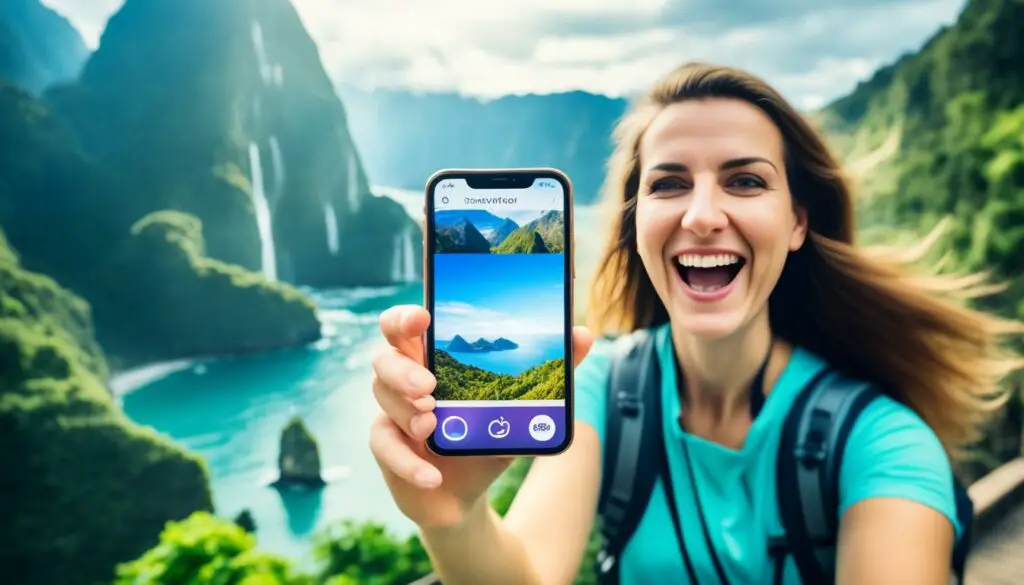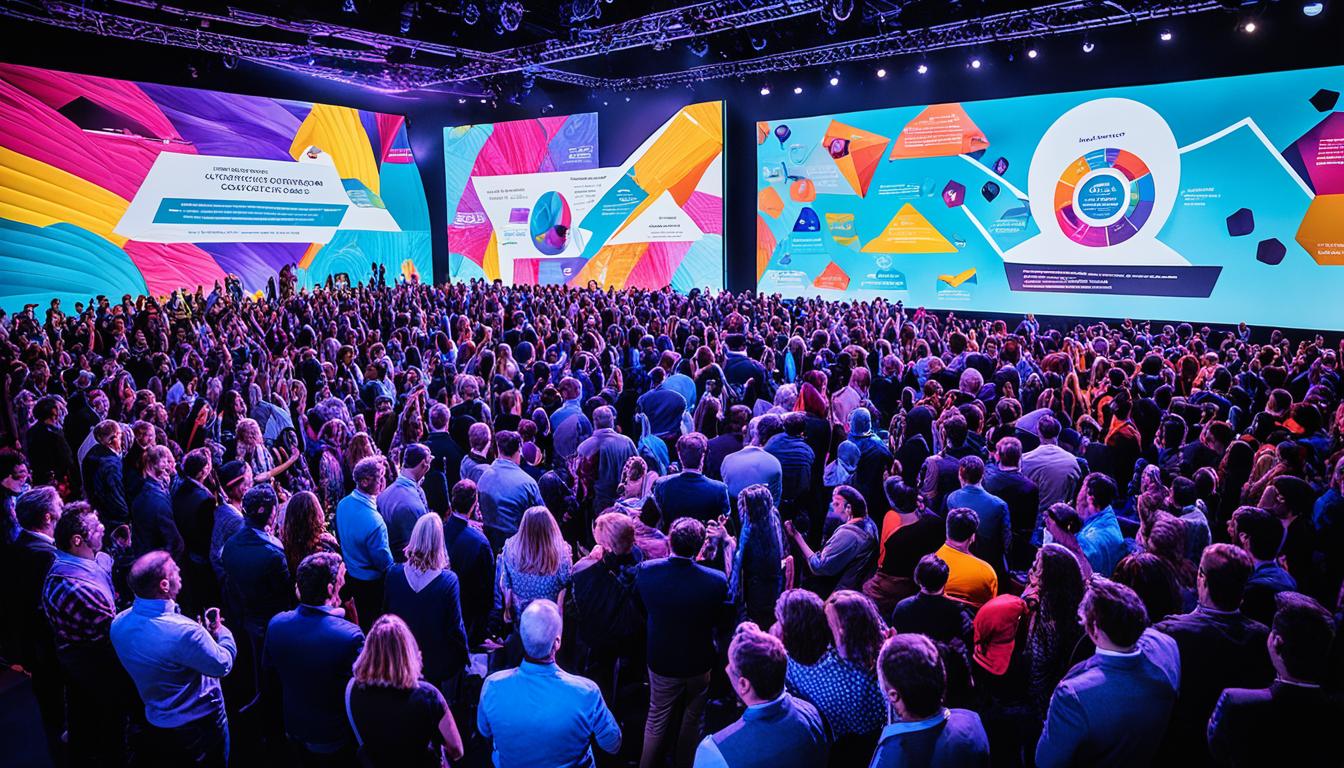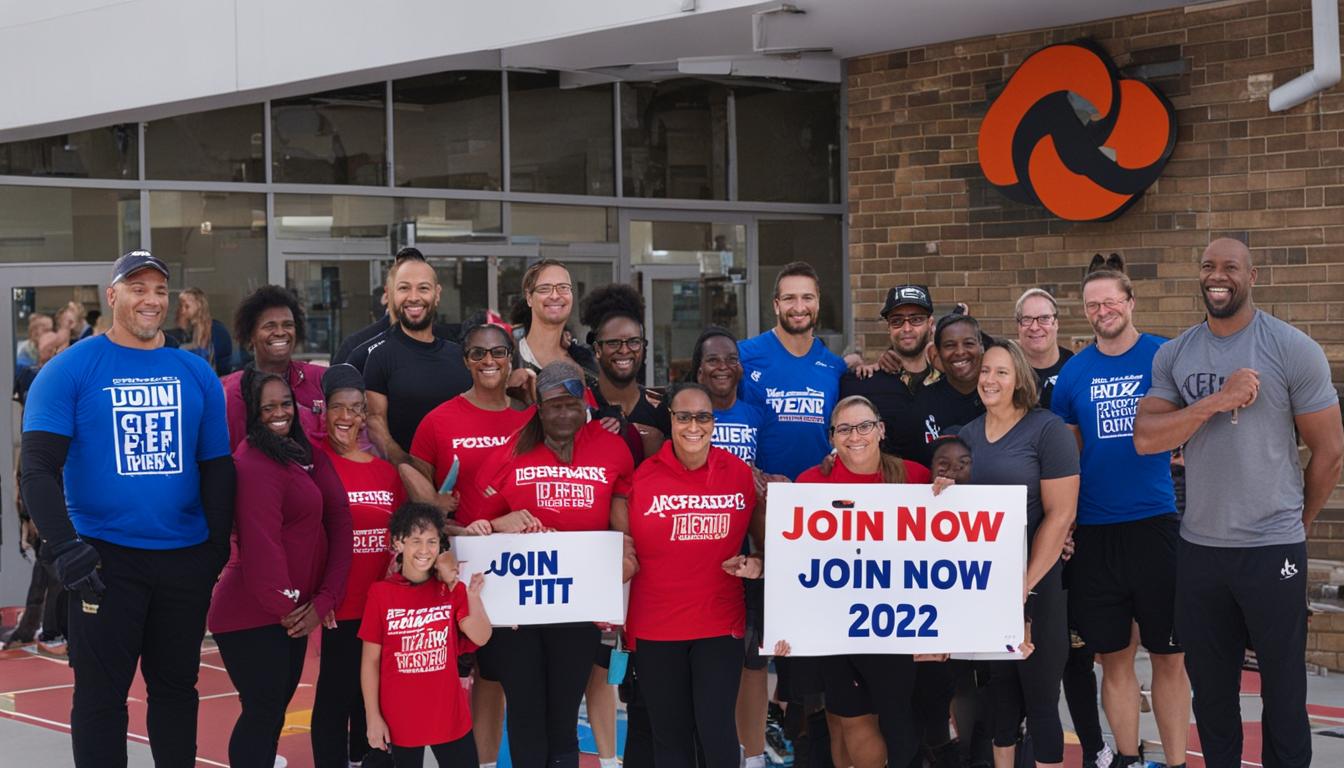In today’s digital age, effective marketing strategies are vital for the success of businesses in the tourism industry. With the increasing competition and evolving consumer preferences, tourism businesses must implement innovative and targeted marketing techniques to attract visitors and stand out from the crowd.
From destination marketing to online advertising campaigns, there are several key strategies that can significantly impact the success of your tourism business. In this article, we will explore the top marketing strategies that will help you stay ahead of the competition and drive growth in the year 2024.
Key Takeaways:
- Understanding your target audience is essential for effective tourism marketing.
- Personalizing content based on customer personas and travel preferences can increase engagement.
- A strong content marketing strategy, featuring engaging blog posts and thematic content, can enhance destination appeal.
- Optimizing your website with relevant keywords and providing a seamless user experience is crucial for search engine visibility.
- Utilizing live video marketing and social media strategies can create authentic connections with potential travelers.
Understanding Your Audience and Personalizing Content
Before creating a tourism marketing plan, it is crucial to understand your target audience. By gaining a deep understanding of their demographics, interests, and travel preferences, you can tailor your marketing messages and offers to resonate with potential customers effectively.
One of the first steps in understanding your audience is to conduct thorough research and analysis. This includes using data from social media research, surveys, and website analytics to gather insights about their evolving needs and preferences. By continuously refining your understanding through audience analysis, you can stay up-to-date with current trends and adapt your marketing strategies accordingly.
Creating Detailed Customer Personas
Customer personas play a vital role in understanding your audience better. These personas are detailed profiles that represent your target customers, incorporating key demographic information, interests, and motivations. By creating customer personas, you can visualize and empathize with your audience, aiding in the development of personalized marketing strategies.
| Demographics | Interests | Travel Preferences |
|---|---|---|
| Age | Hobbies | Preferred travel destinations |
| Gender | Passions | Travel styles (adventure, luxury, budget, etc.) |
| Location | Activities | Preferred accommodation types |
Customer personas allow you to understand the unique needs and desires of different segments within your target audience. By customizing your marketing messages and offers to address their specific preferences, you can create a more personalized and engaging experience for potential customers.
Utilizing Social Media Research
Social media platforms provide a treasure trove of valuable insights into your audience. Conducting social media research allows you to analyze user behaviors, interests, and engagement patterns. By examining popular hashtags, discussions, and trends related to travel, you can identify key topics that resonate with your audience and create content that aligns with their interests.
Additionally, social media research can help you identify influencers and brand ambassadors within your target audience. Collaborating with these individuals can amplify your brand’s reach and credibility, as well as help you tailor your marketing efforts to specific segments of your audience.
Continuously Refining Understanding Through Surveys and Analytics
Surveys and website analytics are valuable tools for gathering direct feedback from your audience. Surveys allow you to ask specific questions and collect data that provides insights into customer preferences, satisfaction levels, and expectations. By analyzing survey responses, you can identify patterns and trends that can inform your marketing strategies.
Website analytics, on the other hand, provide data on user behavior, such as page views, bounce rates, and conversion rates. By analyzing this data, you can gain valuable insights into how users are interacting with your website and identify areas for improvement.
Through continuous audience analysis and refinement, you can ensure that your marketing efforts are highly targeted and personalized. By understanding your audience and personalizing your content, you can create a connection with potential customers and increase your chances of attracting your ideal audience.
Content Marketing Strategy
A strong content marketing strategy is essential for reaching potential travelers and creating lasting impressions. By customizing your content to match your audience’s interests and needs, you can capture their attention and inspire them to explore your destination. Here are some key elements of an effective content marketing strategy for the tourism industry:
Engaging Blog Posts
Create blog posts that go beyond typical travelogue content. Instead of simply listing popular attractions, delve into the heart of your destination by weaving stories and experiences. Share local insights, insider tips, and hidden gems to provide an authentic and captivating portrayal of your locale. Engaging blog posts will keep readers hooked and inspire them to visit and explore the unique aspects of your destination.
Thematic Content and Travel Itineraries
Cater to diverse traveler interests by developing thematic content and travel itineraries. Identify popular themes such as adventure travel, food and wine tours, historical landmarks, or eco-tourism, and create content that caters to these niches. Craft comprehensive travel itineraries that provide a structured guide for visitors. Thematic content and itineraries help travelers visualize their experience and make informed decisions, resulting in increased engagement and conversion rates.
Storytelling and Destination Highlights
Storytelling is a powerful tool in content marketing. Share compelling stories about your destination’s history, culture, and people. Bring your destination to life by highlighting its unique features, such as natural wonders, architectural marvels, or vibrant festivals. Use captivating visuals and descriptive language to create an emotional connection with your audience. Storytelling and destination highlights evoke curiosity and create a desire to experience the destination firsthand.
With a well-crafted content marketing strategy, you position yourself as a reliable resource and establish your brand as an authority in the tourism industry. By providing valuable and informative content, you attract potential travelers and inspire them to choose your destination for their next adventure.
| Benefits of Content Marketing Strategy | Examples of Engaging Content |
|---|---|
|
|
Search Engine Optimization (SEO)
Mastering SEO in the tourism industry is crucial for improving online visibility and driving organic traffic. To achieve this, it is essential to conduct thorough keyword research and identify relevant keywords that align with travel trends and user search intent.
By strategically incorporating these keywords into your website content, meta tags, and headings, you can improve your search engine rankings and increase your chances of being found by potential travelers.
Website optimization is another key aspect of effective SEO. Ensuring your website is mobile-friendly, has fast loading times, and regularly updated with high-quality content can significantly impact its visibility and user experience. Optimizing website navigation and layout can also enhance the overall user experience and make it easier for visitors to find the information they need.
Building backlinks from authoritative sources in the travel industry is crucial for establishing credibility and improving your website’s SEO. By cultivating these reputable backlinks, search engines recognize your website as a valuable resource, increasing its visibility and credibility.
A holistic approach to SEO, encompassing keyword research, website optimization, content quality, user experience, and backlink building, is essential for achieving higher visibility and improving your website’s performance in the competitive landscape of tourism marketing.
| Benefits of SEO in the Tourism Industry | SEO Strategies for Tourism Businesses |
|---|---|
| 1. Increased online visibility | 1. Thorough keyword research |
| 2. Higher organic traffic | 2. Strategic keyword incorporation |
| 3. Improved search engine rankings | 3. Website optimization |
| 4. Enhanced user experience | 4. Backlink building from authoritative sources |
Live Video Marketing
Live video marketing is an effective strategy for tourism businesses to engage with potential travelers and showcase travel destinations and experiences in real-time. By utilizing platforms like Instagram and Facebook, you can provide virtual tours, highlight popular attractions, and interact with viewers through Q&A sessions. This dynamic form of marketing allows you to connect with your audience on a more personal level and provide immediate responses to their inquiries, creating a sense of authenticity and trust. Through live video marketing, you can give viewers an immersive experience and instill excitement and confidence in their travel choices.
One of the key advantages of live video marketing is the ability to engage your audience in real-time. By offering virtual tours, you allow viewers to explore travel destinations without physically being there. This not only saves them time and money but also provides them with a realistic experience that can help them make informed decisions. Additionally, live video marketing enables you to address any questions or concerns that viewers may have, thereby building a stronger connection and enhancing their trust in your brand.
Furthermore, utilizing live video to showcase travel destinations and experiences enables you to captivate your audience with stunning visuals and compelling narratives. You can use the power of storytelling to create a more immersive and engaging experience, allowing potential travelers to envision themselves in the destination and enticing them to book their trip. By highlighting unique features, hidden gems, and local experiences, you can differentiate your destination from competitors and inspire travelers to choose your location for their next adventure.
Adding virtual tours and live experiences to your marketing strategy can also help you stay ahead of the competition. As travelers increasingly seek authentic and immersive experiences, providing virtual glimpses of your destination can set you apart from other tourism businesses. By leveraging the power of live video, you can effectively showcase the unique aspects and attractions of your travel destination, leaving a lasting impression on potential visitors.

In conclusion, live video marketing offers a compelling way to engage with your audience, showcase travel destinations, and provide real-time experiences. By harnessing platforms like Instagram and Facebook, you can captivate potential travelers and generate excitement for your destinations. Through virtual tours, live Q&A sessions, and captivating storytelling, you can establish your brand as a trusted authority and inspire travelers to choose your destination for their next adventure.
Effective Social Media Strategies
Crafting an effective social media strategy involves more than just regular updates. To maximize your reach and engagement, it’s important to choose the right social media platforms for your target audience. In the tourism industry, Instagram and Facebook are two platforms that offer great potential for connecting with potential travelers and showcasing your brand.
When creating your social media strategy, focus on creating engaging content that captures the attention of your audience. Use cohesive branding elements, such as your logo, color palette, and voice, to create a recognizable brand identity. Consistency in your visual and messaging elements across all social media channels will help establish trust and familiarity with your audience.
Create a content calendar that includes a mix of content types to keep your social media profiles interesting and dynamic. This could include a variety of content such as breathtaking photos of travel destinations, informative travel tips, behind-the-scenes glimpses of your operations, and user-generated content that showcases the experiences your audience has had with your brand.
To keep your social media strategy interactive and engaging, take advantage of features like Instagram Stories and Facebook Live events. These real-time updates provide the opportunity to share exclusive content, promote limited-time offers, and directly interact with your audience through Q&A sessions, polls, and contests.
Running interactive contests on social media is a great way to generate excitement and drive engagement. Encourage your audience to participate by offering prizes that are relevant to your travel niche. Contests not only attract potential travelers but also help you gather user-generated content that can be used across your social media channels to showcase authentic experiences.
Create informative content that provides value to your audience. Share travel tips, destination guides, and insider secrets that can enhance the travel experience for your followers. This will position your brand as a trusted source of information and build credibility among potential travelers.
To help you visualize, here’s an example of a content calendar for a tourism business:
| Date | Content Type |
|---|---|
| Monday | Travel Tip Tuesday: How to pack light for your next adventure |
| Tuesday | User-generated content showcase: Share your favorite travel photos with us using #YourBrandExperience |
| Wednesday | Wanderlust Wednesday: Explore the hidden gems of [destination] |
| Thursday | Behind-the-scenes: Meet our knowledgeable guides who make your travel experience unforgettable |
| Friday | Photo Friday: Showcasing the breathtaking landscapes of [destination] |
By diversifying your social media content and engaging with your audience authentically, you can attract potential travelers, foster a vibrant community around your brand, and drive conversions. Remember to analyze the performance of your social media efforts regularly, use analytics to identify trends and preferences, and fine-tune your strategies accordingly to maximize your success in the dynamic landscape of social media marketing.
Accepting Online Bookings
The convenience of online bookings is crucial in today’s fast-paced world of travel. To streamline the booking process for your customers, it is essential to have a user-friendly website with a clear and intuitive layout.
Optimizing your website for mobile devices is also key, as more and more travelers use their smartphones to research and book trips. By ensuring your website is mobile optimized, you cater to the needs of modern travelers and provide a seamless experience.
Offering secure online payment options gives your customers peace of mind when making transactions. Implementing a real-time availability system helps prevent overbooking and provides accurate information to potential customers, increasing their trust in your business.
Embracing online booking systems not only gives your business a competitive edge but also meets the expectations of modern travelers seeking instant confirmation and convenience. By enabling online bookings, you make it easier for customers to plan and secure their travel arrangements.
Key Benefits of Accepting Online Bookings:
- Convenience for travelers
- User-friendly website and intuitive layout
- Mobile optimization for seamless booking process
- Secure payment options for customer confidence
- Real-time availability for accurate information
| Benefits | Description |
|---|---|
| Convenience for travelers | Allowing customers to book at their convenience, anytime and anywhere. |
| User-friendly website and intuitive layout | Creating a website that is easy to navigate and understand, making the booking process efficient for users. |
| Mobile optimization for seamless booking process | Ensuring that your website is mobile-friendly, providing a smooth booking experience for customers using their smartphones. |
| Secure payment options for customer confidence | Offering secure online payment options, such as encrypted transactions and trusted payment gateways, to ensure customer data protection. |
| Real-time availability for accurate information | Implementing a system that updates availability in real-time, avoiding overbooking and providing customers with up-to-date information. |
AI-Powered Marketing Strategies
As AI technology continues to evolve, it presents opportunities for advanced marketing strategies in the tourism industry. AI has the potential to revolutionize marketing efforts by automating processes, analyzing data, and enabling personalized experiences. From personalized content creation to chatbot customer support, the applications of AI in tourism marketing are vast and promising.
Personalized Content Creation
With AI, tourism businesses can leverage customer data to create personalized marketing content. By analyzing user preferences, past behavior, and demographic information, AI algorithms can generate tailored marketing messages that resonate with individual customers. This hyper-personalized approach enhances customer engagement and improves conversion rates.
Chatbots for 24/7 Customer Support
Chatbots powered by AI provide round-the-clock customer support, answering queries, and assisting potential customers in their travel planning journey. These virtual assistants offer immediate responses, personalized recommendations, and real-time information, improving customer satisfaction and streamlining the booking process.
Seamless Social Commerce Integration
AI enables seamless integration of social commerce into tourism marketing strategies. By leveraging AI algorithms, businesses can analyze social media data to identify trends, target specific customer segments, and deliver personalized offers. This integration enhances the user experience, facilitates direct booking, and drives conversions.
Micro-Moment Marketing
Micro-moments are small instances where potential customers actively seek information or make decisions while planning their trips. AI-powered marketing strategies can identify and leverage these micro-moments, delivering targeted advertisements, personalized recommendations, and relevant content at the right time. By capitalizing on these micro-moments, businesses can increase their chances of converting potential customers into confirmed bookings.
User Experience and Hyper-Personalization
AI plays a crucial role in improving user experience and hyper-personalization across various touchpoints in the customer journey. By analyzing user data, behaviors, and preferences, AI algorithms can personalize website experiences, recommend relevant products, and create customized itineraries. This level of personalization enhances customer satisfaction and drives loyalty in the fiercely competitive tourism industry.
Video Advertising
Video advertising powered by AI is a valuable tool for capturing the attention of potential travelers. By analyzing user data and preferences, AI algorithms can deliver targeted video advertisements across platforms, ensuring maximum reach and engagement. Videos allow businesses to showcase the unique experiences and attractions of a destination, leaving a lasting impression on viewers.
By embracing AI-powered marketing strategies, tourism businesses can stay ahead of the curve and create meaningful connections with their target audience. The advanced capabilities of AI in personalized content creation, chatbot customer support, social commerce integration, micro-moment marketing, user experience enhancement, hyper-personalization, and video advertising provide a competitive advantage in the ever-evolving landscape of tourism marketing.
Conclusion
In conclusion, successful marketing strategies are essential for the tourism industry in 2024. To stay ahead of the competition and attract more customers, tourism businesses must understand their audience, personalize content, optimize their websites for search engines, utilize social media, accept online bookings, and embrace AI-powered marketing strategies. By continuously adapting their strategies to the latest industry trends, businesses can maximize their success in the ever-evolving landscape of tourism marketing.
Understanding the target audience and creating personalized content is crucial in capturing their attention and generating interest. By conducting in-depth research and analysis, businesses can develop detailed customer personas that align with their travel preferences and interests. This allows for the creation of compelling and targeted marketing messages that resonate with potential customers.
In addition, optimizing websites for search engines and utilizing social media platforms effectively are key to reaching a wider audience. By implementing SEO best practices and engaging with users through captivating content and interactive features, businesses can improve online visibility and foster a loyal community of followers.
Furthermore, embracing the power of AI in marketing offers businesses the opportunity to enhance customer experience and generate meaningful connections. From personalized content creation to 24/7 customer support through chatbots, AI-powered strategies enable businesses to deliver tailored experiences that meet and exceed customer expectations.
FAQ
What is the importance of understanding the target audience in tourism marketing?
Understanding the target audience is important in tourism marketing because it allows businesses to create personalized marketing messages and offers that resonate with potential customers. By catering to their specific demographics, interests, and travel preferences, businesses can attract their ideal audience and increase engagement.
How can content marketing be utilized in the tourism industry?
Content marketing in the tourism industry can be utilized by creating engaging blog posts that go beyond typical travelogue content and delve into the heart of the destination. It also involves developing practical guides, travel itineraries, and themed content to cater to diverse traveler interests. By creating valuable and informative content, businesses can position themselves as reliable resources and establish their brand as an authority in the industry.
How can search engine optimization (SEO) improve online visibility in the tourism industry?
SEO in the tourism industry can improve online visibility by conducting keyword research and strategically incorporating relevant keywords in website content, meta tags, and headings. Optimizing the website for mobile devices, ensuring it has fast loading times, and regularly updating it with high-quality content also help improve search engine rankings. Additionally, cultivating reputable backlinks from authoritative sources in the travel industry enhances credibility and visibility.
How can live video marketing be beneficial for tourism businesses?
Live video marketing allows tourism businesses to showcase travel destinations and experiences in real-time. Through platforms like Instagram and Facebook, businesses can provide virtual tours, show popular attractions, and engage with viewers through Q&A sessions. This more engaging and authentic connection with potential travelers generates excitement and confidence in their travel choices.
What are some effective strategies for social media marketing in tourism?
Some effective strategies for social media marketing in tourism include choosing the social platforms where the target audience spends most of their time, such as Instagram and Facebook. Cohesive branding elements should be utilized to create a recognizable brand identity. Diversifying content with breathtaking photos, travel tips, behind-the-scenes glimpses, and user-generated content helps engage the audience. Running interactive contests and creating informative content like travel tips and guides also fosters a community around the brand.
How can accepting online bookings benefit tourism businesses?
Accepting online bookings benefits tourism businesses by providing convenience in the fast-paced world of travel. By offering a user-friendly website with a clear and intuitive layout, businesses make the booking process streamlined for potential customers. Optimizing the website for mobile devices, providing secure online payment options, and implementing a real-time availability system ensures accurate information and meets the expectations of modern travelers seeking instant confirmation and convenience.
What are some AI-powered marketing strategies for the tourism industry?
AI-powered marketing strategies in the tourism industry include personalized content creation, 24/7 customer support through chatbots, and seamless social commerce integration. Implementing micro-moment marketing strategies that target potential customers at the right moment in their travel planning journey is also effective. Utilizing video advertising across platforms helps capture the attention of the audience and convey tourism offerings effectively.





